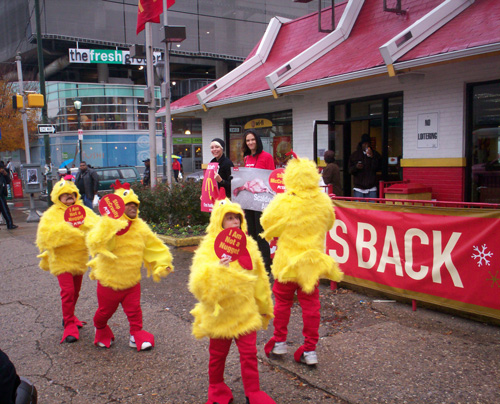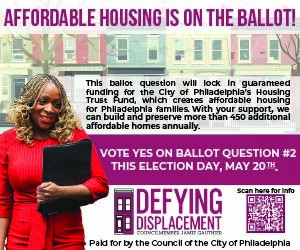Penn’s student newspaper, The Daily Pennsylvanian, has a story today on the McDonald’s at 40th and Walnut Street, which Penn officials characterize as a scourge in the neighborhood around campus.
The article’s author, Rachel Baye, writes:
Those involved with past and present development of the corner say McDonald’s is a hot spot for crime and a source of malnutrition. Getting rid of it, they say, will bring economic growth and make the neighborhood safer.
Baye quotes many Penn officials as saying that they would love to oust McDonald’s and add more upscale housing and shops. McDonald’s, apparently, is not interested in moving. The Daily Pennsylvanian included an article last week on the problems with public transportation near campus as well. Race and class, of course, are at the heart of the conversation in both stories.









February 28th, 2011 at 5:39 pm
The only “crime” i have ever witnessed at that location was perpetrated by Penn Students. I have lived and worked in that area for years and the hipocrisy is astounding.
February 28th, 2011 at 5:43 pm
I agree with Colleen. While I despise McDonald’s and would like to see it go away because the food is crap there is no more crime there than anywhere else in the area. Maybe the arcade at Spruce should go too – I hear about more problems there than McD’s.
February 28th, 2011 at 5:50 pm
Sorry – I had another thought. If Penn wants to reduce the number of criminals on that block, then they should stop leasing to Bank of America.
February 28th, 2011 at 6:05 pm
This and the related articles on Daily Pennsylvanian show a very disconcerting assumption of dominion and thoughtless plans of gentrification that seem to go un-checked in the area in and around the campus of Penn. West Philadelphia was not created by or for Penn, and working *with* the community as it exists rather than changing it to suit its students from privileged backgrounds should be Penn’s goal.
It is not the fault of restaurants that serve lower income individuals and families that the crime rate around 40th street is so high, the blame rather squarely rests on the extreme disparity between the over-indulgent and over-priced nature of shops like Bobby’s Burger Palace and the median income of the people who live in the neighborhood mere feet to the West and North. Whenever you try to gentrify an area by putting in overpriced shops and eateries you get higher crime rates.
I’ll leave it to better minds to debate if this method of gentrification is or should be legal, but the conclusion that I have come to is that those who desire the higher end shops with their higher prices and higher quality will undoubtedly have to deal with the fact that to patronize those places will put them in harms way. Class warfare isn’t pretty, and when you shove an upper income society directly next to a lower income society you’re going to get social tension. As Penn is the interloper in what is already an established region, it is up to Penn to make the region economically viable enough to support the society it wishes to be surrounded by.
How could Penn do this? Well, rather than pay corporations that take money out of the area to come in and establish new businesses, Penn could instead invest the money it is giving away in local business people and established communities. Penn could pay to improve streets other than the ones within its ever expanding ‘borders’. They could consult with community organization on how best to keep housing affordable for those that live in the area already. They could help families and blocks maintain and improve their surroundings rather than dumping money only in to projects that create an elite, ivory towered, gilt corridor.
What would make the neighborhood safer? Creating jobs and opportunities for those who have resorted to crime because of the lack of opportunity that has traditionally existed in the area, instead of creating jobs and opportunity only for those who can afford the new higher prices.
February 28th, 2011 at 8:16 pm
Penn came to West Philadelphia in 1872, so I think it’s hard to call them an “interloper.” In fact, the university predates much of the development in West Philadelphia.
Whether or not you agree with the university’s approach to development (and I agree that some of Penn’s efforts have done more harm than good) I think it’s fair to say they have improved the area – or, perhaps, that they’ve sped-up a process of “gentrification” that would’ve likely happened anyway, given how close we are to Center City.
This is Philadelphia. After decades of blight and decay, I don’t think it’s fair to complain about bringing investment back in the neighborhood. After all, everyone benefits from a safer, cleaner, more attractive community, whether or not they can afford to eat at Bobby’s Burger Palace. (And judging from the fancy cars I see driving around here – I doubt they all belong to Penn students – I can imagine there are quite a few people willing to pay $7 for a burger.)
February 28th, 2011 at 10:25 pm
All I can think is that there’s bigger fish to fry here. McDonald’s? Really? Let’s get the priorities straight.
And if anyone tries to shut down University Pinball, I *will* go into serious withdrawal symptoms without my Batman Pinball fix.
March 1st, 2011 at 11:11 am
Dan, you write, “After all, everyone benefits from a safer, cleaner, more attractive community, whether or not they can afford to eat at Bobby’s Burger Palace.”
A safe, clean, attractive community is nice, I’ll grant, but the median price for home sales in the area immediately surrounding Penn has increased fivefold in the past twenty years, and as an administrative assistant at the University, I can now barely afford to live within walking distance of my employer. My colleagues in lower pay grades certainly can’t afford to live nearby. I’d hardly call that a benefit. Please remember that not everyone at Penn is a professor, doctor, or well-heeled undergrad.
March 3rd, 2011 at 8:26 pm
I like Steak, Egg & Cheese Bagels.
There, I said it.
March 5th, 2011 at 4:07 pm
Like Kate & many others, I mourn the higher housing prices that are partly due to gentrification. However, most residents of our metropolitan area are unable to walk to their work. This is still a delicious advantage for many who University City.
Dan Reed is undoubtedly correct: the pulse of middle-class settlement in formerly-tatty inner-ring neighborhoods runs in a smooth circle, from Fishtown to Northern Liberties to Fairmount & Spring Garden to UC, and back to the Delaware through SW Center City, Bella Vista & Queen Village. We’re just part of that larger picture. While Penn (plus Drexel & USP) are part of the engine driving this change, they’re not the sole source.
James Jackson goes overboard in worrying about “social tensions” when you have “an upper income society directly next to a lower income society.” “Class warfare isn’t pretty,” he warns darkly. In fact, social tensions are much more painful, and social ills more extreme, in other W Philly neighborhoods that haven’t been “gentrified.” The working-class kids of W Philly come to UC, to 40th & Walnut & to McDonald’s, because they like it here: UC feels pretty & safe to them.
“Gentrification” is a buzzword from the ’70s that should be laid to rest in 2011. Urban neighborhoods, over time, are prone to changes of class. Higher-income neighborhoods have been recycled as lower-income neighborhoods, & vice versa. Welcome to the big city, everyone! It so happens that “eds & meds” have been a major growth industry in Philadelphia for 2 generations now — fortunately for W Phila, which has benefited from a fountain of new jobs. We can only hope there’ll be more such “gentrification.” That’s particularly important for lower-income Philadelphians, who are desperately overrepresented in the population. It is the poor who most need more middle-class & prosperous residents to settle in the city: they who need the tax base to pay for public services.
So if that’s what we mean by “gentrification,” it’s a very good thing overall.
Sadly, it is a myth at the city level in Philadelphia. In the past 30 years, the poverty rate in Phila has steadily climbed. More neighborhoods have gone down the social ladder than up. The city badly needs more UCs.
I eat at McDonald’s, by the way. Got no problem with it, ever.
February 22nd, 2012 at 1:41 pm
as one homeowning neighbor of mine said to me years ago, “gentrification is a good thing. it doesn’t do anybody any good to live in a slum.” a few years later she was complaining to me that the city was raising her property taxes. can’t have it both ways. gentrification has made my neighborhood *slightly* safer and a lot more expensive, and after 22 years i can barely afford to stay.
February 22nd, 2012 at 4:58 pm
The city has not actually reassessed any properties is more than 22 years. At the Apple Lofts meeting I saw a representative from the Office of Property Assessment say that, and affirm that that he had been working there (and its predecessor, Bureau of Revision of Taxes) for that entire time. In other words, the property tax increases during that period have been from City Council actually just raising everyone’s taxes, not gentrification.
Property taxes may play a role in places with a “normal” assessment process and to be sure landlords and realtors try to cash in when a neighborhood gets designated “hot” but basically if anyone says property taxes from gentrification has driven them from their Philadelphia home, they are outright lying. The reality is currently the amount of property tax you pay is basically determened by when you bought not what your most recent neighbor paid.
February 22nd, 2012 at 9:33 pm
When 99% of West Philadelphians use the term “gentrification” they are proving their ignorance time and again. Gentrification has a specific definition and carries with it a very specific history. Past due time for everyone to read a book or at least a wiki.
February 22nd, 2012 at 9:36 pm
And really, people, can we stop pretending that the Fresh Grocer is anything more than a Thriftway with Whole Foods pricing designed to gouge the neighborhood? That whole stretch is filled with garbage storefronts. They really need a locally owned franchise like Subway.
February 22nd, 2012 at 10:16 pm
I see that my replies are being deleted. Just know that they were poignant and clever and that I was mostly correct.
If you (editor) think I’m a spammer or troller, I’m not and yes I use a shared computer with other people who participate on this site and NO they are not all me. 🙂
February 23rd, 2012 at 9:12 am
I can see your replies.
February 23rd, 2012 at 9:37 am
Sure, putting a Whole Foods there would make people on both sides happy, as Whole Foods is a small business.